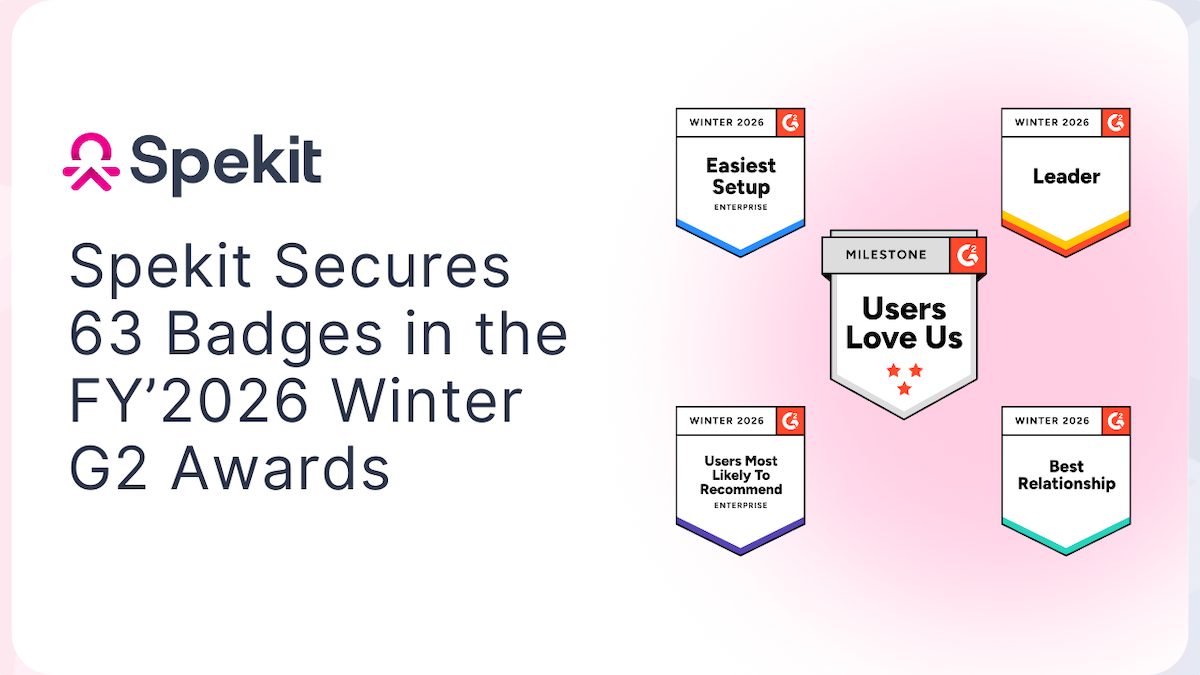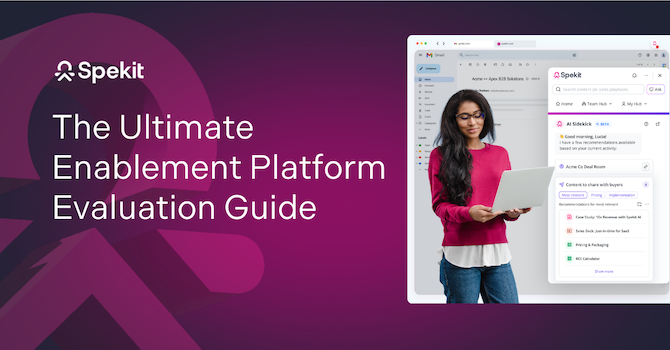Sales reps who feel overwhelmed by technology are 43% less likely to meet their quota than non-overwhelmed sellers. Yet, sellers find themselves in a perpetual state of information overload–using an average of 10 tools to close deals.
The fix? Using fewer, but more powerful, sales enablement tools. By streamlining your tech stack, reps stand to unlock 27% extra bandwidth—especially if you include sales intelligence software in the mix.
This article covers everything you need to know about sales intelligence software—what it is, how it works, why it’s an important addition to your tech stack, and the best sales intelligence software for streamlining your sales process and maximizing revenue.
What is sales intelligence?
Sales intelligence is the collection and analysis of data from different sources to help sales reps better understand their prospects, improve sales strategies, and ultimately close more deals.
What is sales intelligence software?
Sales intelligence software automates the process of gathering and analyzing sales-related data to help businesses improve the ROI of their sales efforts. These tools typically integrate into existing tech stacks so that sales reps have instant access to critical intel, such as real-time analytics, customer segmentation, automated lead scoring, advanced prospect profiles, and AI-driven knowledge and strategy recommendations.
There are various types of sales intelligence tools to choose from, each of which specialize in specific actions. Spekit, for example, is a just-in-time sales enablement platform that leverages AI to surface the answers, knowledge, and playbooks when and where your reps need them.
Benefits of using sales intelligence tools
Let’s break down the major benefits of adding sales intelligence tools to your tech stack.
Centralized sales content
By centralizing your sales content to an intelligent CMS platform, deal-accelerating resources and real-time updates can be surfaced by your reps directly where they sell. This ensures reps are always reaching out to the right prospects at the right time, and with the most relevant information. Businesses leveraging intelligent sales enablement tools stand to earn 6-10% higher close rates.
Reduced manual work
Many sales intelligence tools feature data enrichment functionalities that aggregate up-to-date information from multiple sources, providing a complete and accurate overview of each prospect.
The result? Less time wasted on manual data entry that can quickly go stale, not to mention domino into chasing dead leads.
Improved productivity
Sales intelligence software can help businesses save time by automating repetitive tasks, such as analyzing data, generating reports, and emailing follow-ups. These tools also optimize the most time-consuming parts of the sales process, like researching leads and building customer profiles.
This gives reps more time to nurture high-value prospects and close deals faster.
Maximized revenue
Sales intelligence tools accelerate the sales process by making it easy to identify which prospects are most likely to convert into customers and offering tailored recommendations on how to make it happen.
This allows sales reps to focus on where their efforts will have the greatest impact—cue higher conversion rates and revenue growth.
Top 11 sales intelligence software
These are the best sales intelligence software options for optimizing your team’s time and energy—and maximizing revenue in the process.
1. Spekit
.png)
Spekit is an AI-powered just-in-time sales intelligence software designed to centralize and surface the resources sales reps need to ramp and close deals faster. Spekit’s AI sales tool, Spekit AI, delivers the most relevant content to sales reps exactly when they need it. No more hopping from app to app or endless searches—just the right content, at the right time, wherever your reps work.
You can also use Spekit AI to create playbooks, sales scripts, and other training materials in minutes, not months. Convert lengthy business documents into bite-sized training snippets with one click, deliver real-time sales plays for high-value accounts, and receive instant alerts when prospects engage with your content for perfectly timed follow-ups.

Key features:
- Automatically surface the right content at the right time
- Deliver real-time sales plays for high-value accounts and target industries
- Generate baseline content lightning-fast
- Transform a simple command into playbooks that accelerate sales
- Summarize lengthy documentation into bite-sized training with a single click
- Eliminate guesswork with AI content recommendations for meeting follow-up
- Simplify reporting with user, team, and buyer-level content analytics
Best for: Intelligently surfacing answers, content, and training materials–all in real-time
2. ZoomInfo Sales

ZoomInfo is a sales intelligence software that helps performance-driven sales teams make every interaction count. Capture and analyze all customer interactions, such as calls, meetings, and emails, and receive AI-powered recommendations to push deals forward. On the flipside, use AI-driven warning signals to identify stale or at-risk opportunities.
You can also pinpoint the personas most likely to engage with you using ZoomInfo’s intelligent recommendations engine—learn how to use ZoomInfo to get the most out of this functionality and more.
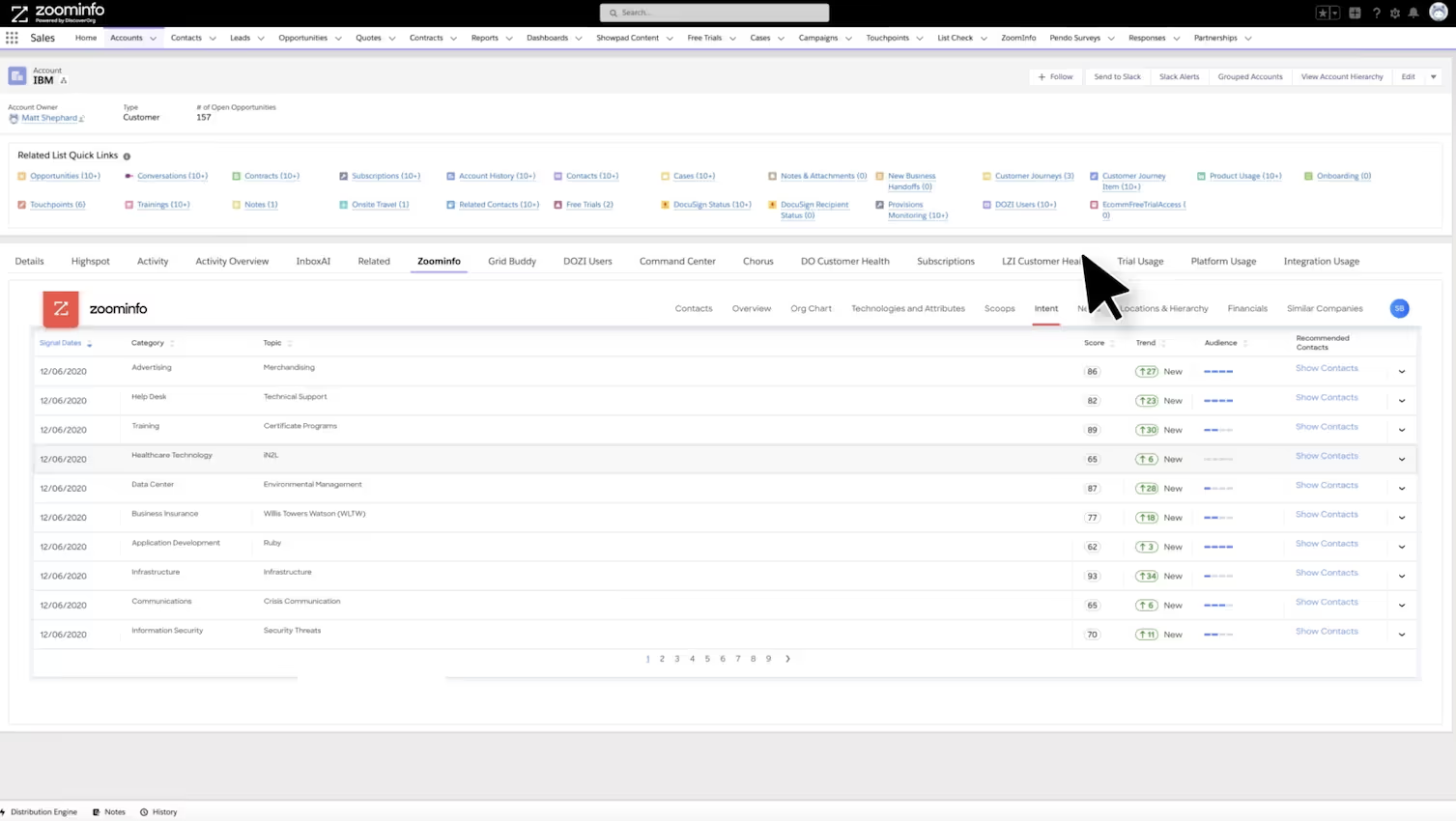
Key features:
- See intel about your key accounts to help tailor your conversations
- Capture and analyze the voice of the customer to understand what’s impacting deals
- Turn insights into action with automated workflows
- Receive real-time alerts about your prospects, like job changes or new product launches
Best for: Conversation intelligence
3. LinkedIn Sales Navigator

LinkedIn Sales Manager provides reps with the relationship insights needed to have meaningful conversations with the decision-makers who matter. Its Account IQ feature blends real-time LinkedIn first-party data (people, posts, and workforce trends) with third-party data, and using generative AI, produces deep dives on specific prospects with the click of a button.
Sellers can then use this data to show up to every call with a strong understanding of each prospect.
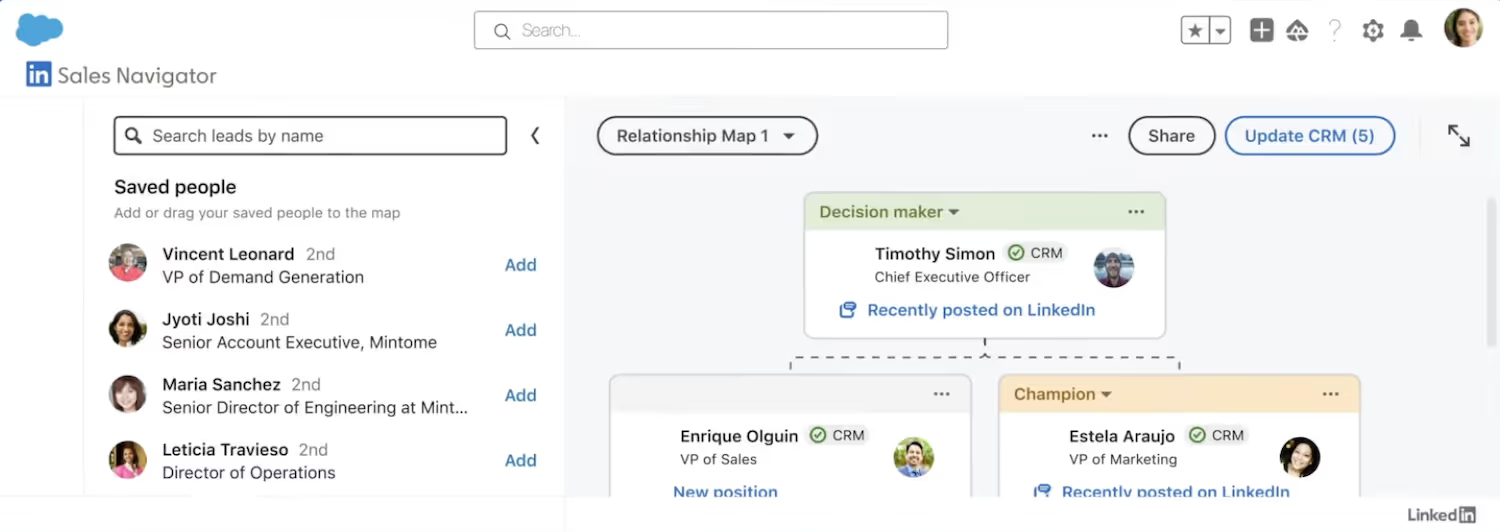
Key features:
- See updates for your entire book of clients
- Monitor LinkedIn activity for insight and engagement cues
- Track when a relationship may be at risk
- Receive real-time alerts about your prospects, like promotions and product launches
- Quickly prepare high-level account plans
Best for: Relationship intelligence
4. Clari

Clari is a revenue platform that uses automation and AI to help sales teams take charge of their entire sales process and revenue operation. It analyzes the activity data captured by your tech stack (sales calls, deals, marketing automation) and aligns that data to help your team identify actionable patterns and pinpoint your most valuable prospects, taking the guesswork out of your sales cycle.
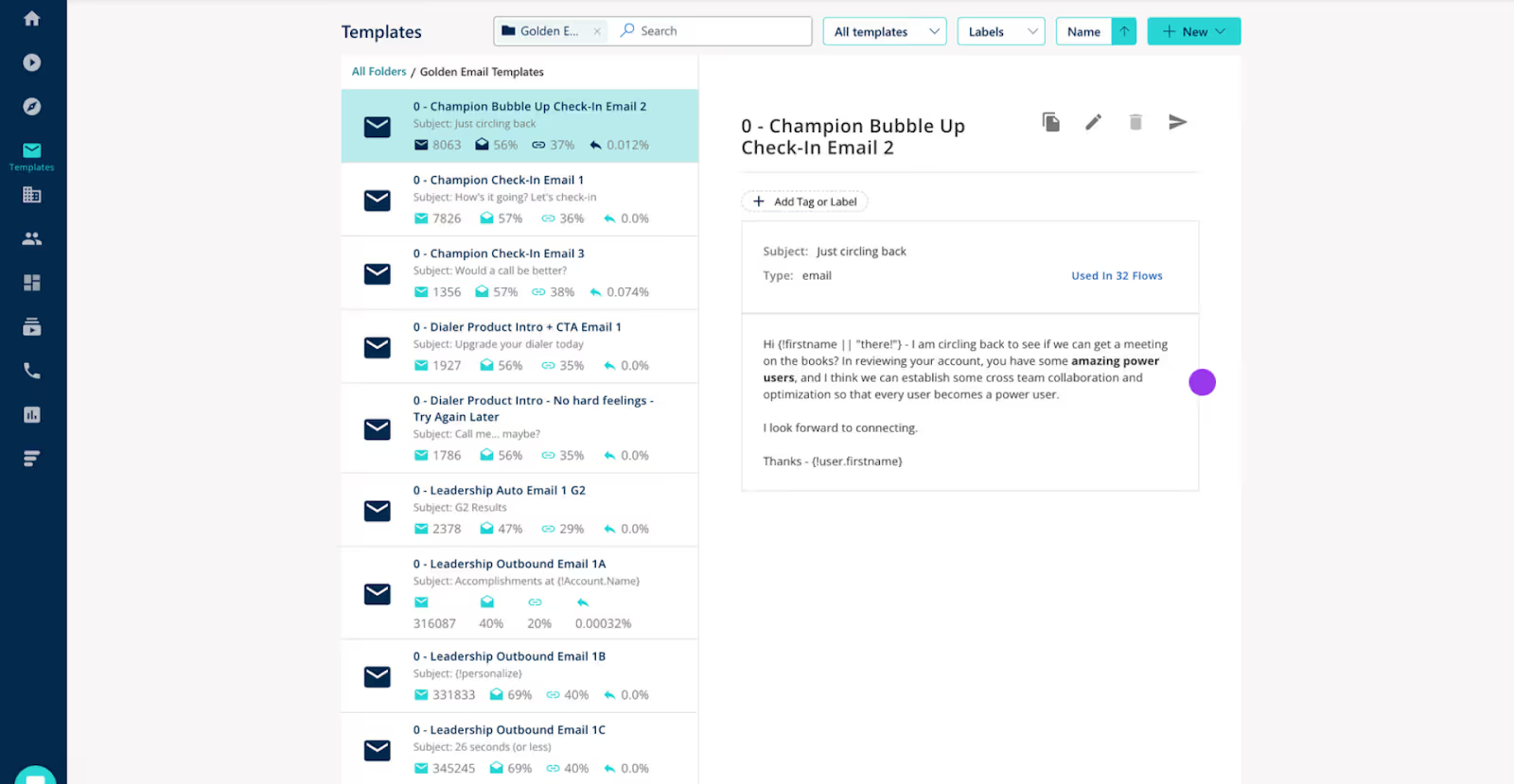
Key features:
- Gain full-funnel visibility to streamline your process
- Track and manage call summaries and highlights
- Receive AI-powered health scores and deal prioritization
- Identify and stop all areas of revenue leak
Best for: Revenue operations
5. Seamless.ai

Seamless AI is a real-time sales lead search engine that helps sales teams find direct dials, mobile numbers, and email addresses for prospects. The platform uses AI to continuously crawl the web in order to provide up-to-date and verified contact information. It allows you to build lists of more than 10,000 prospects within minutes, and provides customized insights for every contact so you can send highly personal messages from the jump.
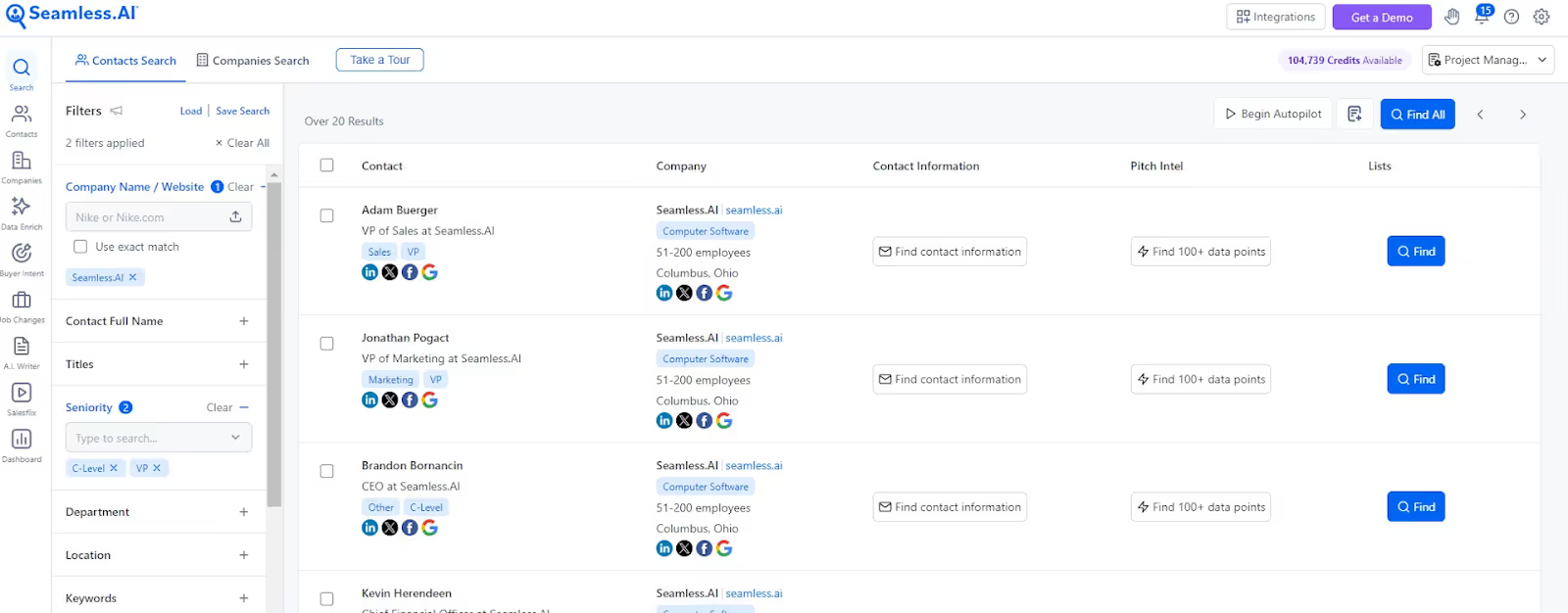
Key features:
- Build prospect lists with over 10,000 contacts
- Automate list-building with Autopilot
- Get real-time access to your prospects’ data for personalized interactions
- Leverage AI to analyze and prioritize leads based on their likelihood to convert
Best for: Lead sourcing
6. Apollo.io

Apollo is an end-to-end sales intelligence platform that provides all the tools you need to prospect, engage, and close more deals. It offers a database of over 250 million contacts from more than 60 million companies, along with a scoring engine that can help you prioritize high-quality leads. With the Apollo AI writing assistant, you can also generate and send customized emails to your contacts.

Key features:
- Find and manage leads, prospects, and sales opportunities
- Create and send personalized emails to prospects using AI
- Use AI-powered workflows to streamline critical tasks, like outreach or follow-ups
Best for: Email personalization
8. Dialpad

Dialpad is an AI-powered sales intelligence software that gathers real-time transcriptions of sales calls, and can generate a call summary that gets automatically sent to everyone at the end of the call. It also features built-in speech recognition and natural language processing that can help sales teams optimize their outreach conversations.
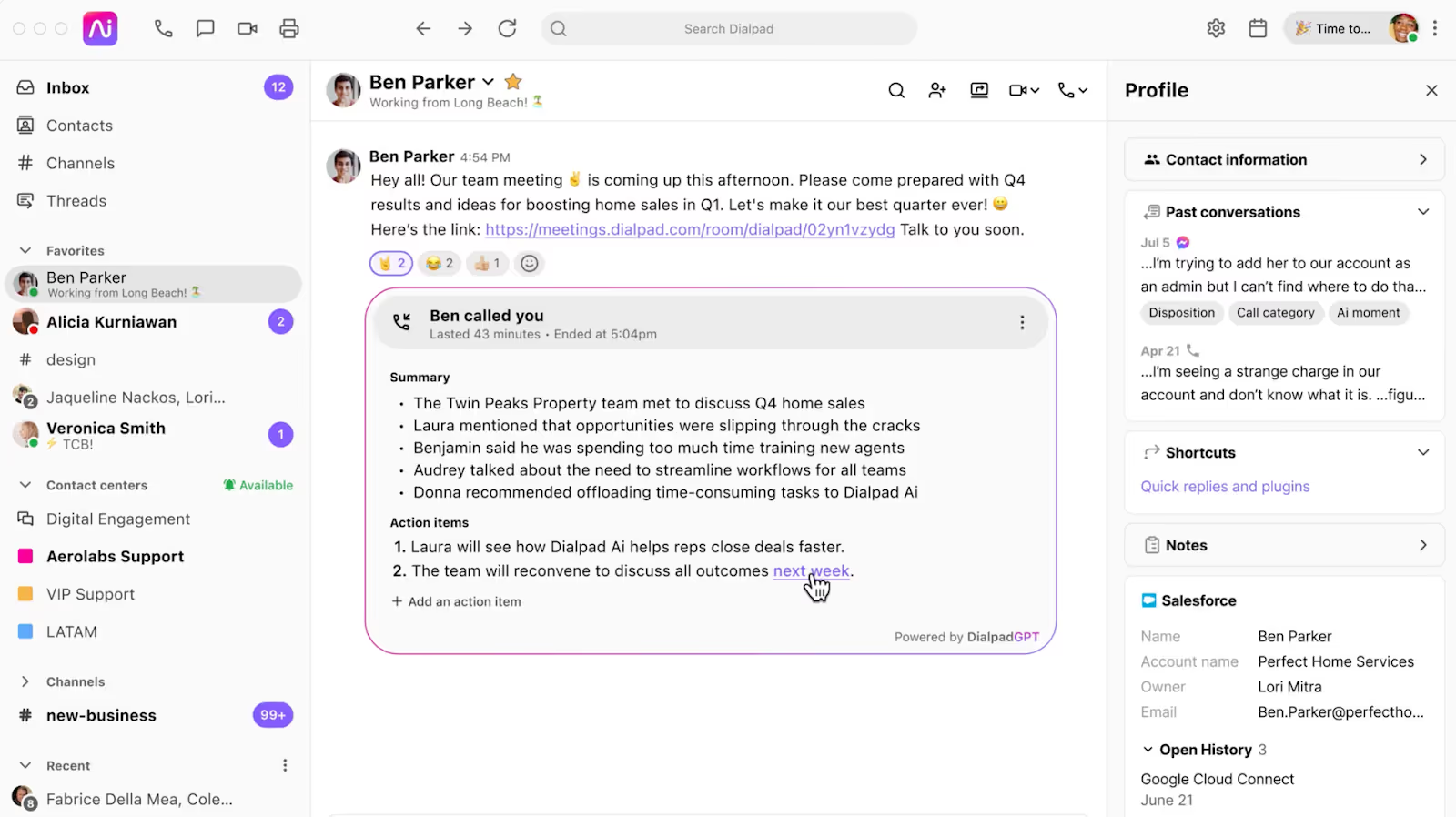
Key features:
- Transcribe calls and video meetings in real-time
- Spot if a call is veering off course directly from your dashboard
- Generate a call summary that’s automatically emailed to everyone at the end of the call
- Leverage AI to fill out QA scorecards automatically
Best for: Customer intelligence
9. Drift

Drift is a conversational sales intelligence platform that allows you to engage with website visitors around the clock using AI-driven chatbots and messaging. The chatbots automate conversations, insights, and recommendations, and learn from each interaction to improve future responses. They also qualify visitors based on predefined criteria, then pass these leads to your sales team for outreach.
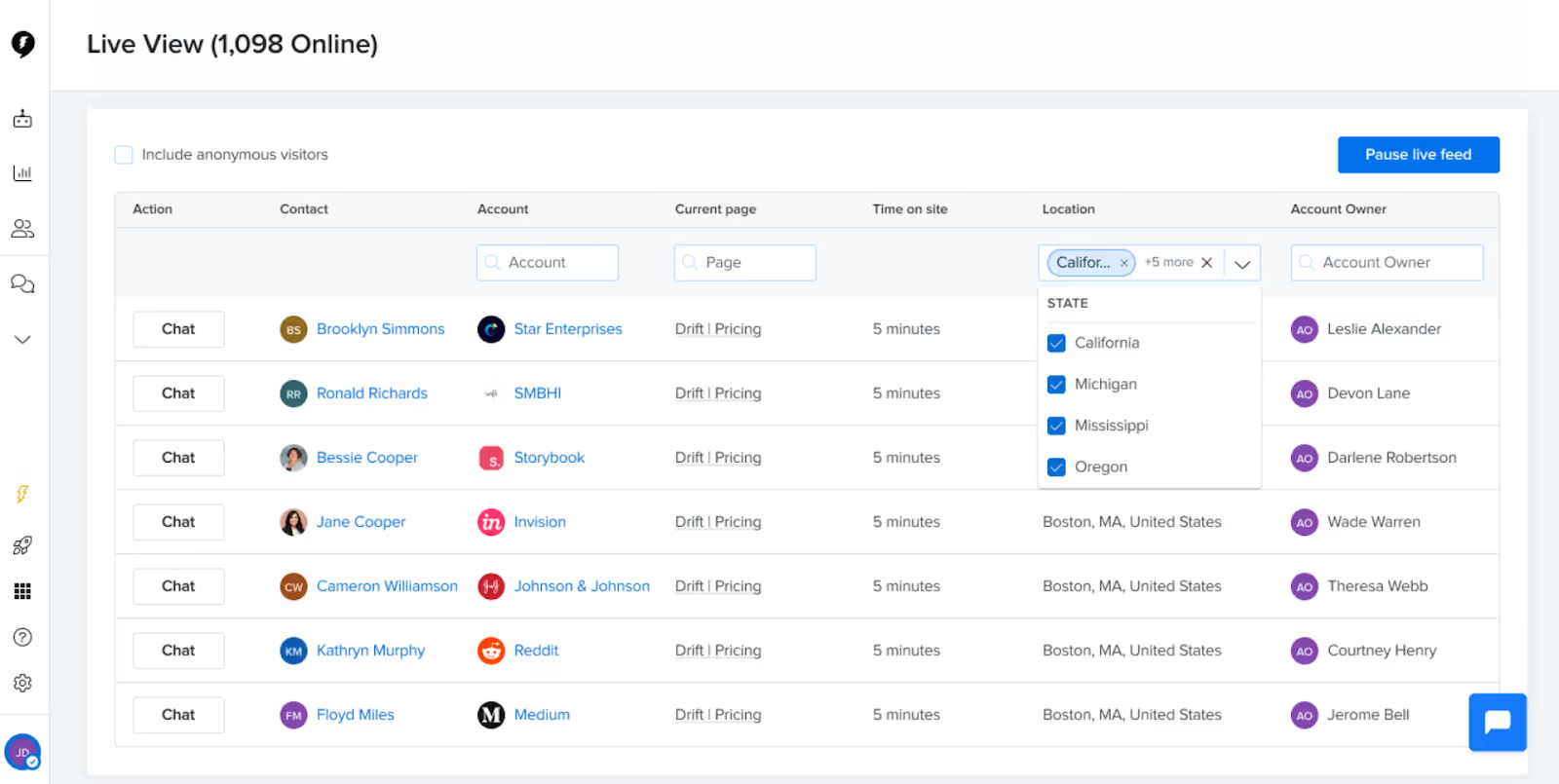
Key features:
- Engage with website visitors around the clock
- Handle routine inquiries and qualify visitors based on predefined criteria
- Provide personalized recommendations to visitors based on their browsing behavior
Best for: Conversational intelligence
10. Similarweb

Similarweb is a sales intelligence software that gives you complete visibility into how the companies you’re targeting behave online, so you can adapt your sales strategy accordingly. Receive alerts when there are changes to a prospect’s digital strategy and performance, discover their pain points in the context of their industry, and use that intel to create targeted solutions for them.
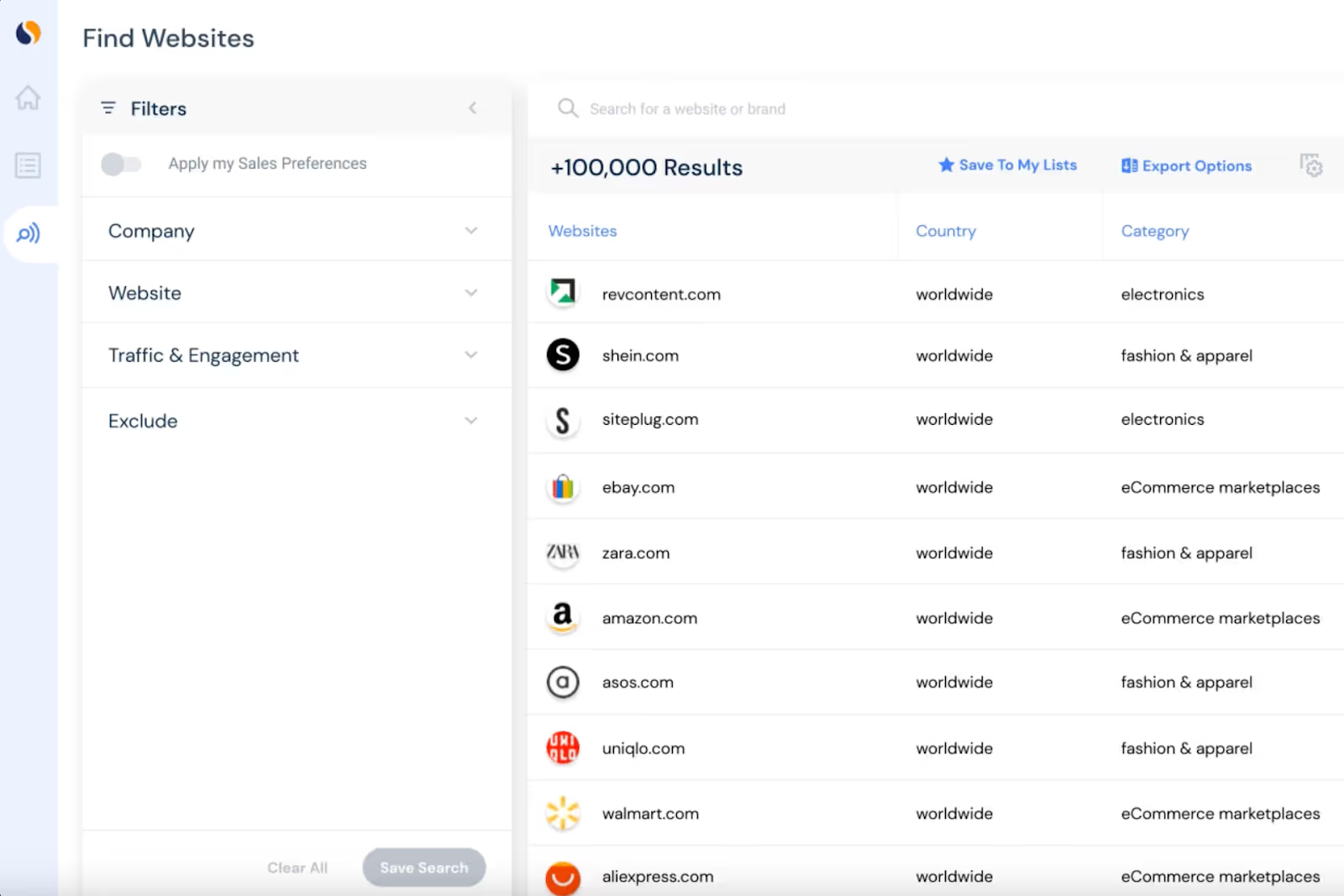
Key features:
- Pinpoint the accounts most likely to turn into revenue
- Monitor your target accounts for windows of opportunity
- Deliver the right pitch at the right time with automated alerts and customized insights
- Automate workflows at every stage of the funnel
Best for: Competitor monitoring
11. Nektar
Nektar is the GTM telemetry platform that captures every email, meeting and stakeholder interaction across your revenue team. It automatically creates contacts, tracks participation and enriches opportunities. It then writes it all back to your CRM without any UI or adoption friction.
Nektar acts as a diagnostic equipment that shows what’s actually happening in deals before you prescribe solutions. With this visibility, GTM teams can identify answers to questions like which deals haven’t had a meeting in the past few weeks,which opportunities are missing key stakeholders,which reps are spreading themselves too thin versus staying focused, or what factors consistently predict wins versus losses, using historical intelligence.
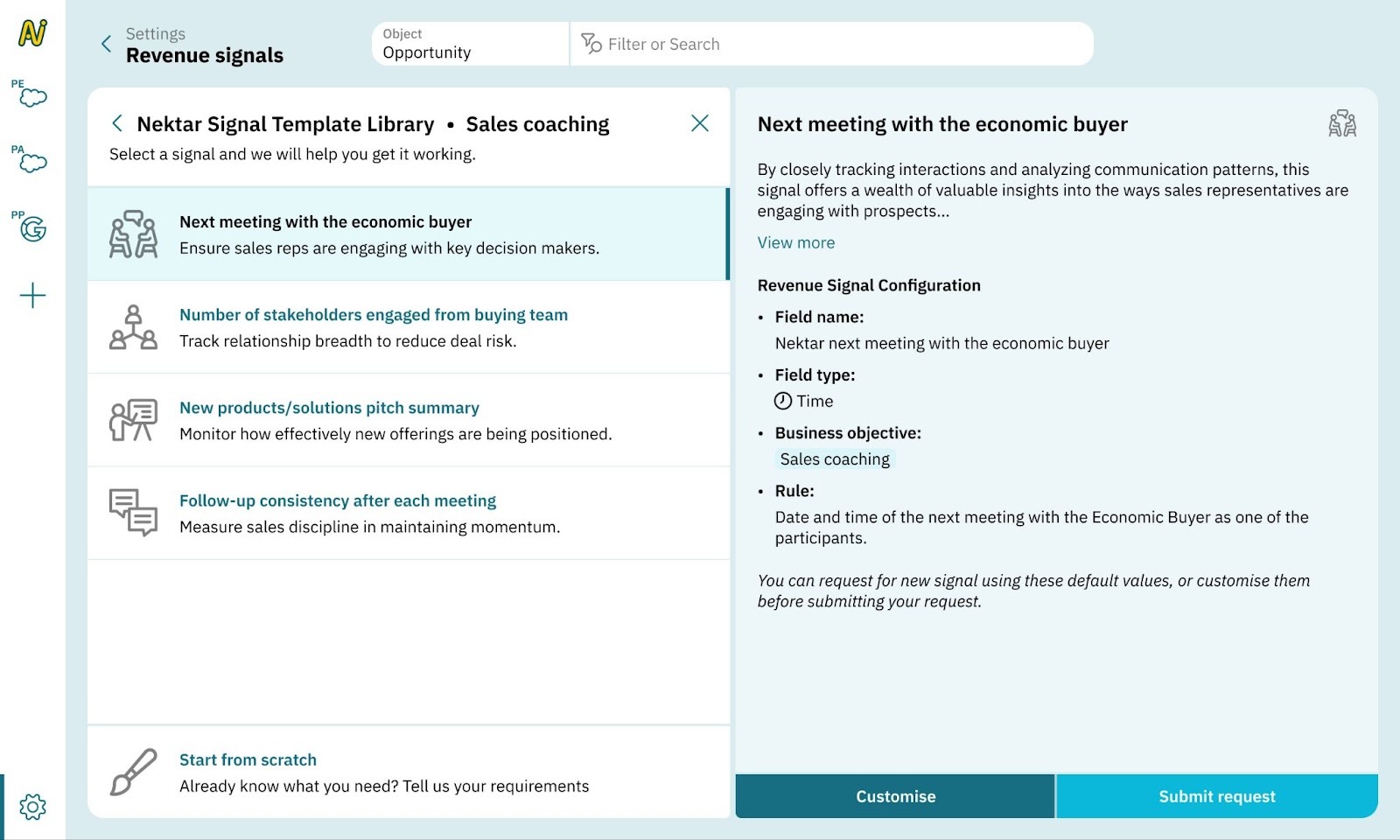
Key Features:
- Automated CRM Data Updates: Automatically updates closed-lost reasons in your CRM by extracting historical context from conversations.
- Enhanced Buying Group Visibility: Identifies and adds all contacts involved in a buying group along with roles (economic buyer, champion, evaluator) to the opportunity object in your CRM.
- Opportunity Page Automation: Updates opportunity risk, competition, and temperature based on conversation recency and frequency.
- Customizable AI Agent within your CRM: Nektar’s UI lives within your CRM, providing AI-summarized insights on accounts and opportunities.
- Data Ingestion: Ingests data from various sources, including Google Meet transcripts, and other call recording tools like Gong, Clari, and Copilot.
- CRO Dashboard: Provides a forward dashboard for the next two weeks of meetings, allowing CROs to proactively manage coverage and ensure the right SMEs are involved.
Best for: Revenue Operations
Other top sales intelligence software platforms
The picks below may not have made the top 10, but they still deserve a mention. If you need more suggestions for top sales intelligence software platforms, look no further.
- Gong (Best for: Revenue intelligence)
- Crystal (Best for: Personality intelligence)
- Reply (Best for: Cold email outreach)
- Bombora (Best for: Intent data intelligence)
- Crunchbase (Best for: Prospecting intelligence)
- Factors.ai (Best for: Account intelligence)
- Cience (Best for: Demand generation)
- Adapt (Best for: Lead intelligence)
- RingCentral (Best for: Conversation intelligence)
- Detective (Best for: Prospect relevance)
- 6sense (Best for: Revenue intelligence)
- Instantly (Best for: Email outreach)
- Albacross (Best for: Buying intent intelligence)
- Demandbase (Best for: Go-to-market intelligence)
- Traq.ai (Best for: Sales coaching intelligence)
- Leadfeeder (Best for: Lead generation)
- Overloop (Best for: Outbound campaigns)
- UpLead (Best for: Prospecting intelligence)
FAQs on sales intelligence tools
In case you have more questions about sales intelligence tools, here are answers to some of the most common.
What is the difference between CRM and sales intelligence?
Customer relationship management (CRM) is a tool that tracks all of your company’s interactions with current and potential customers across the entire customer lifecycle, including sales calls, customer service interactions, follow-up emails, and more.
Sales intelligence maximizes the value of your CRM data by extracting insights, trends, and patterns, and uses them to make data-driven recommendations that sales reps can use to shorten the sales cycle and maximize revenue. You can also use sales intelligence software to keep your customer data up-to-date so reps don’t waste time chasing non-existent leads.
What does a sales intelligence analyst do?
A sales intelligence analyst oversees the analysis and interpretation of customer and sales analytics, the end goal being to increase a company’s sales and revenue. The role focuses on analyzing key performance indicators and monthly, quarterly, and annual sales revenue, then making specific recommendations that customer-centric teams can use to optimize their sales pipeline.
What is intelligent sales?
Intelligent sales is the process of analyzing your sales pipeline to identify areas for improvement, such as bottlenecks in your sales funnel that need to be fixed and which reps need more sales training to hit their quota. Keeping your pipeline up-to-date ensures your reps are focusing on the most promising leads and allows you to adjust your sales strategy as your business evolves.
You can manage your sales pipeline stages efficiently and accurately with the help of Spekit, an AI-powered just-in-time sales enablement software designed to close your sales productivity gap, streamline sales coaching, and provide reps with the information they need, right when they need it.
Choose the best sales intelligence platform
Improving sales performance is about more than centralizing your sales content, it’s about putting that content into measurable action. Top performing sales reps are twice as likely to report they can always find answers to questions independently, and this is exactly where Spekit shines as the best sales intelligence platform.
Prospecting happens in real-time, and so should your playbooks. Spekit’s AI-powered content recommendations automatically surface contextually relevant content right where your reps are selling— in Gong, Chorus, Salesforce, LinkedIn, and more. It organizes the suggested content by theme, ensuring the exact intel reps need in that moment is never more than a click away.
No more context-switching or digging through stale content only to come up empty: sales teams get the exact information they need, exactly when they need it, in any tool or workflow.

.avif)


